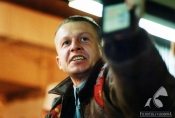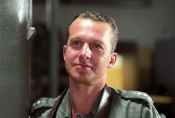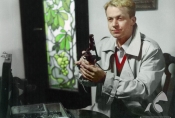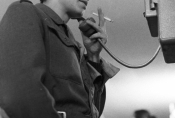Bogusław Linda
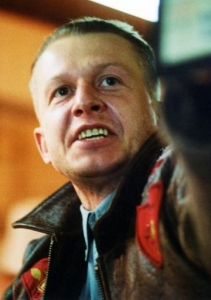
One of the finest Polish film actors, however audiences had to wait several years to admire his acting talent because films by Agnieszka Holland, Krzysztof Kieslowski, and Janusz Zaorski – shot in 1980-1982 – were stopped by the censor and were only released in 1987.
He was born on June 27, 1952 in Toruń. A graduate of the Acting Department of the State Higher School of Theatre in Krakow (1975). While still a student, he joined Krakow's Stary Theatre (1975-1976), and later worked in Polski Theatre in Wrocław (1977-1981) as well as in theatres in Warsaw: Współczesny (1981-1982) and Studio (1983-1986). On occasion a screenwriter and director, he is also an experienced educator, co-founder of the Warsaw Film School. Winner of many prestigious awards, including four Golden Ducks (1988, 1992, 1993, 1996), the Zbigniew Cybulski Special Award for lifetime achievement, with particular emphasis on the roles played in the years 1980-1982 (2009).
He debuted on TV as a halberdier in the series Czarne chmury/Black Clouds (1973) by Andrzej Konic. His first film role was Stefan Sierosławski, a friend of Stanisław Przybyszewski, in Haakon Sandøy’s biopic Dagny (1976). He gained popularity starring in the series Punkt widzenia/Point of View (1980) by Janusz Zaorski – the story of the lives of several graduates of the University of Warsaw, seven years after graduation. The series turned out to be a springboard to a great career.
Over the course of the next few years, Linda gave several outstanding performances in some of the most important films by Agnieszka Holland, Krzysztof Kieślowski, Wojciech Marczewski, Janusz Zaorski and Andrzej Wajda. In Holland’s Gorączka/Fever (1980), an impressive adaptation of Andrzej Strug’s novel, he played the impetuous anarchist Gryziak. He went on to play Jacek Grochala, a young, crippled man, in the next film by this director, Kobieta samotna/A Lonely Woman (1981). One of the darkest portrayals of life in socialist Poland, the film is a story about the love of two people, rejected by society. The real masterstroke was his next role, or rather three variants of one, in Przypadek/Blind Chance (1981) by Krzysztof Kieslowski. The fate of Linda’s character Witek Długosz depends on chance: whether he misses his train, gets into a fight with a Railway Protection Service officer, or stays on the platform. In the first case, he becomes a socialist youth activist, in the second – an anti-communist oppositionist, and in the third – a politically uninvolved scholar. No less important and perfectly executed are his smaller roles, such as the Security Service officer in Dreszcze/Shivers (1981) by Wojciech Marczewski, or Klemens, one of the sons of Łucja in Matka Królów/The Mother of Kings (1982) by Janusz Zaorski, an enthralling adaptation of the novel by Kazimierz Brandys, telling the story of the dramatic fate of a single woman raising four sons against the backdrop of the turbulent Polish history unfolding in 1933-1956. Later, Linda starred in films by Andrzej Wajda: a smaller role as Dzidek in Człowiek z żelaza/Man of Iron (1981) and a bigger one as Louis Antoine Saint-Just in Danton (1982). Seventeen years later Wajda would cast Linda as Jacek Soplica (Fr. Robak) in his adaptation of Mickiewicz's Pan Tadeusz (1999).
The role of lieutenant Arek in Kroll (1991) initiated his close collaboration with Władysław Pasikowski. His performances as Franz Maurer, a long-time officer of the Security Service, working in the police after the political transformation in Psy/Dogs (1992) and Psy 2. Ostatnia krew/Dogs 2. Last Blood (1994), Major Edward Keller in Demony wojny według Goi/Demons of War According to Goya (1998), Edward Bronski, a Polish agent in Iraq, in Operacja Samum/Operation Samum (1999), or Alex, a professional killer in Reich (2001), showed Linda’s other image as an actor. Later, he had a series of similar roles in what some critics dubbed “men’s cinema” while others referred to it in less generous terms as “bandit movies.” These include Miasto prywatne/Private City (1994) by Jacek Skalski, Stacja/The Station (2001) by Piotr Wereśniak, Maciej Ślesicki’s Tato/Dad (1995) and Sara (1997). It is worth mentioning Jacek Bromski’s thriller Zabij mnie glino/Kill me Cop (1987). “He is the only American actor in Poland,” the director said in an interview.
He is more than just an “American actor,” he is one of our most versatile thespians. Here are some examples of how diverse (and how perfectly acted) his roles can be – Bolko, son of Hans Heinrich, in Magnat/The Magnate (1986), Tadeusz Bogucki, a friend of the Wats, in Wszystko, co najważniejsze/Everything That Is Most Important... (1992) by Robert Gliński, the magician Stygma in Jańcio Wodnik/Johnny Waterman (1993) by Jan Jakub Kolski, Michał in the adaptation of Manuela Gretkowska’s novel “Szamanka” (1996) by Andrzej Żuławski, Rysiek “Rudy” in Złoto dezerterów/Gold of the Deserters (1998) by Janusz Majewski, Petronius in Quo Vadis (2001) by Jerzy Kawalerowicz, the sheriff in Summer Love (2006) by Piotr Uklański, or Major Bolesław Wieniawa-Długoszowski in 1920. Bitwa warszawska/1920. The Battle of Warsaw (2011) by Jerzy Hoffman. All these performances earned him several awards at various festivals.
“You are not an artist at all times. You are only an artist from time to time, not too long, though,” Linda said in an interview. It is obvious that there are exceptions to this rule.
Selected filmography
-
1980
FEVER
reż. Agnieszka Holland
-
1981
A LONELY WOMAN
reż. Agnieszka Holland
-
1981
BLIND CHANCE
reż. Krzysztof Kieślowski
-
1981
MAN OF IRON
reż. Andrzej Wajda
-
1981
SHIVERS
reż. Wojciech Marczewski
-
1982
THE MOTHER OF KINGS
reż. Janusz Zaorski
-
1992
THE DOGS (THE PIGS)
reż. Władysław Pasikowski
-
1993
JOHNNIE THE WATERMAN
reż. Jan Jakub Kolski
